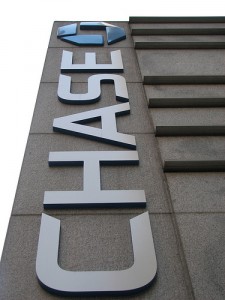Flawed Incentives and Dubious Morals: JPMorgan & CDOs That Were "Built to Fail"
It’s been a busy week for JPMorgan Chase. It’s only Wednesday, and already the bank has settled one civil fraud lawsuit and been slapped with another one. Both shed light on Wall Street’s flawed system of incentives that helped bring on the financial crisis. They also raise questions as to the morals of bankers.
 Photo: epicharmus
Photo: epicharmusOn Tuesday, JPMorgan agreed to pay $153 million to settle civil fraud charges brought by the SEC alleging that it “misled” investors when it sold them junky mortgage bonds. The deal in question was put together by Magnetar Capital. If you’re not familiar with Magnetar, it’s an Illinois-based hedge fund that made a killing shorting synthetic mortgage-backed securities that were essentially built to fail. Here’s how it worked: Magnetar would put down a few million bucks to start a collateralized-debt obligation (CDO), cram it full of the junkiest mortgage bonds it could find, then get a bank like JPMorgan to sell it off to investors as a triple-A, gold-plated piece of the booming housing market; when in reality it was a time bomb filled with toxic waste. Whatever Magnetar lost when the thing went bust, it more than made up by taking out massive short positions against it. For a real world corollary, consider this akin to building a crappy house, selling it to someone, and then taking out an insurance policy so that when it falls down or catches fire, you get paid big bucks. (For more on Magnetar, check out the amazing work NPR’s Planet Money and ProPublica did last spring.)
On Monday, federal regulators sued JPMorgan for allegedly duping credit unions into buying $278 million in mortgage bonds that were “destined to perform poorly,” ie, built to fail. Now, part of the reason JPMorgan emerged from the crisis relatively unscathed is that it realized fairly early on that the housing market was set to go bust; so it stopped investing so heavily in mortgage-backed securities. But it didn’t stop selling them. There was too much money to be made peddling these securities to people who were still bullish on the housing market. Was JPMorgan obligated to relieve them of this view? Of course not. Investing is like gambling. You think this horse is going to win, I think another horse is going to win; let’s see who’s right. Plus, all these deals came with “voluminous” risk disclosures stating exactly what was in these deals. So no one could claim they weren’t aware of what they were buying. What got JPMorgan in trouble is that they didn’t tell their clients that the deal had been put together so that a third party could bet against it. This is basically what got Goldman Sachs in trouble last year with the Abacus deal it put together for John Paulson.
Now, let’s consider the incentives.
We pay a lot of attention to incentives at Freakonomics. Understanding what motivates people, and how incentives align with outcomes can help uncover all kinds of interesting, unexpected things, whether you’re looking at school teachers or sumo wrestlers. It’s no different with investment bankers and CDO deals. See, the bankers at JPMorgan who sold these CDOs got paid regardless of how the things performed, whether every one of the thousands of mortgages stuffed into them paid off, or whether they all defaulted. So the incentive for the bankers was to sell as many CDOs as possible, even if they knew they were going to blow up in a year or two. It wasn’t their problem because it wasn’t their money. This raises an obvious moral question: were bankers morally remiss in pumping these mortgage bombs out into the world when they knew the wreckage they would cause? Or were they simply being good at their job? Maybe, but then how morally remiss are tobacco companies or fast food restaurants? Whether it’s cigarettes or food loaded with trans fats, society has essentially deemed that when it comes to things that aren’t good for us, as long as we know the facts, it’s buyer beware. The CDO equivalent of the Surgeon General’s warning are those risk disclosures describing what sorts of mortgages they contain. Apparently, not many buyers read the fine print.
Assuming he had the correct view of the housing market back in 2007, a “moral banker” was someone who ended up leaving a lot of money on the table. Considering the incentives as they were, how morally remiss were these bankers?

Comments